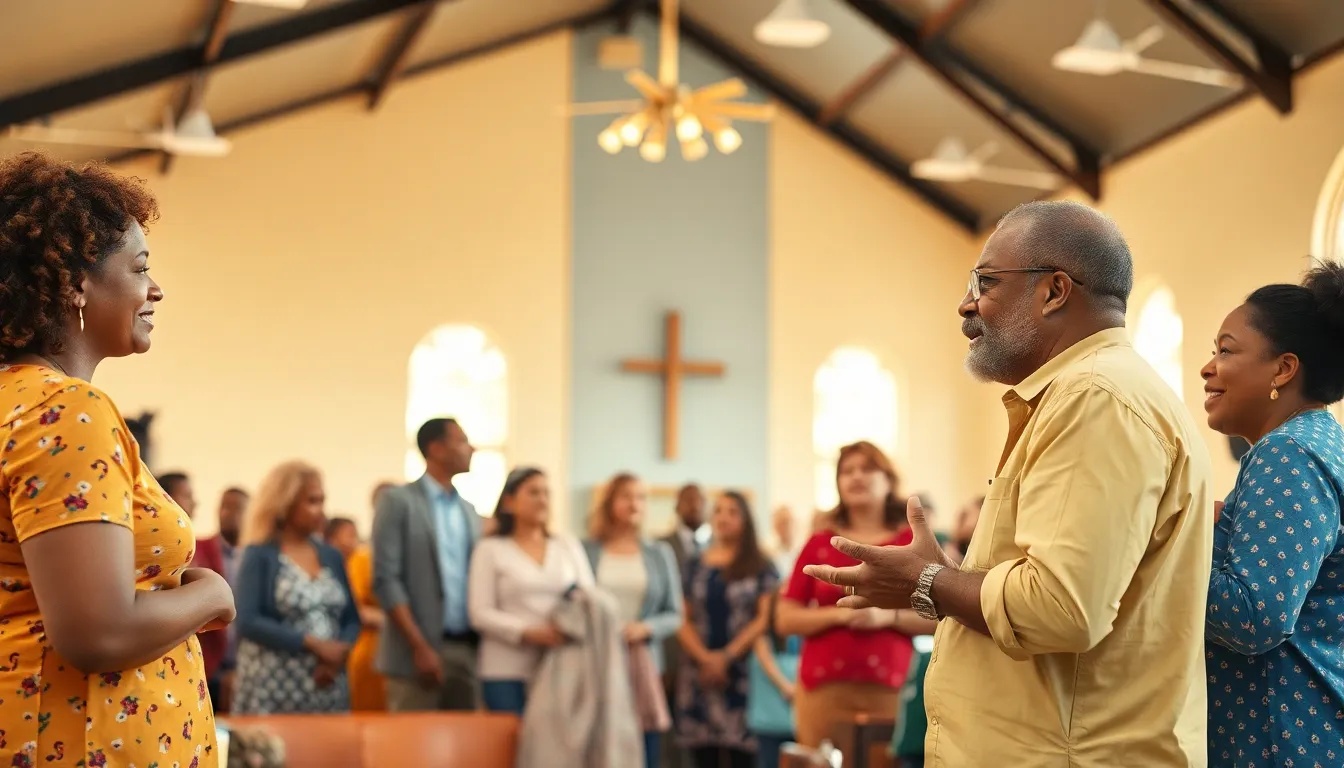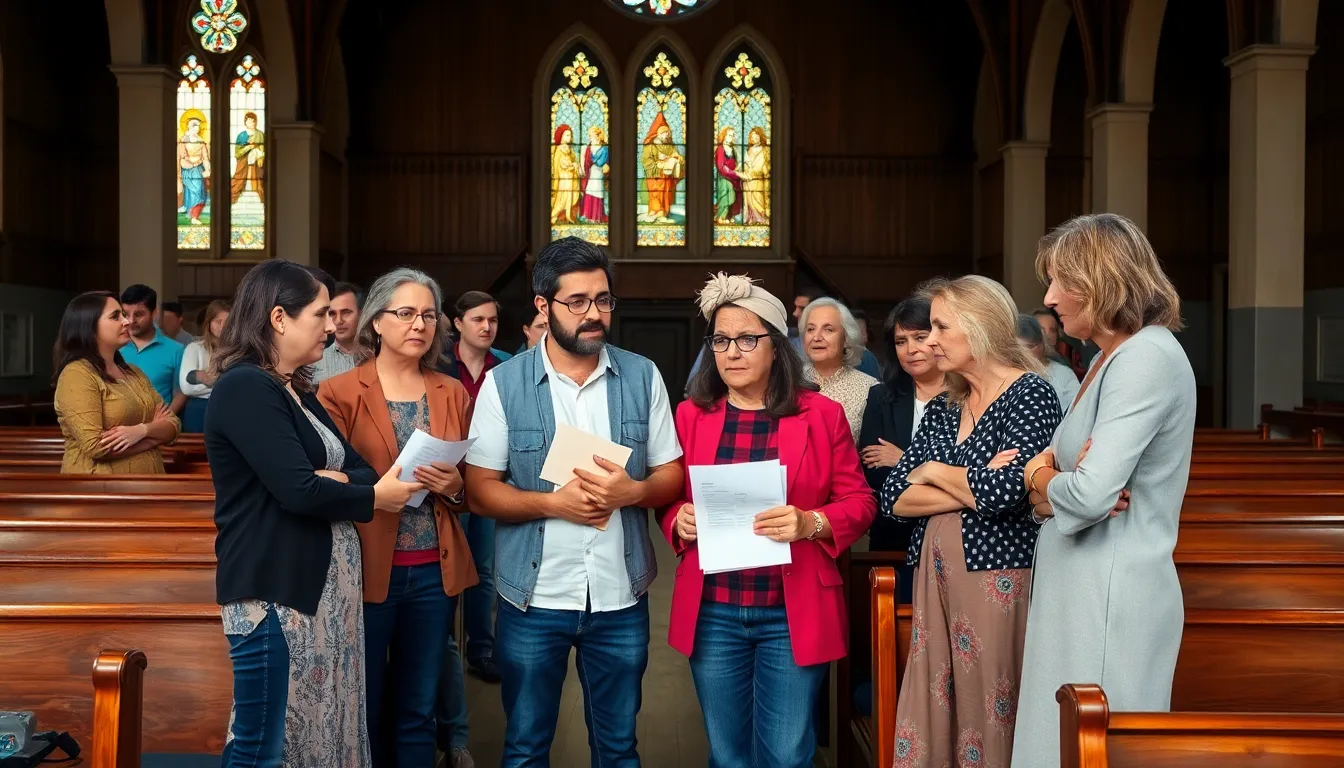Finding a spiritual home where we feel welcomed and valued is essential for our faith journey. Yet sometimes we might notice subtle signals that suggest our church community isn’t as embracing as we’d hoped. These signs can leave us feeling confused uncertain and questioning our place within the congregation.
We’ve all experienced moments when something feels “off” in our relationships – and sadly this can happen in religious settings too. When pastoral staff members seem distant when we’re consistently overlooked for involvement opportunities or when our concerns fall on deaf ears these red flags shouldn’t be ignored.
Recognizing these warning signs isn’t about being overly sensitive or paranoid. It’s about understanding our worth and ensuring we’re investing our time energy and spiritual growth in a community that truly wants us there. Let’s explore the telltale indicators that might suggest it’s time to find a new church home.
Recognizing the Warning Signs Your Church Doesn’t Want You
Social exclusion manifests when congregants consistently bypass you during fellowship gatherings and coffee hours. Members cluster in established groups while you remain standing alone even though multiple attempts to join conversations. These moments reveal underlying dynamics about community acceptance patterns.
Leadership positions remain perpetually closed to your participation even after years of faithful attendance. Committee assignments get distributed among the same circle of individuals while your offers to volunteer go unacknowledged. Pastoral staff maintains formal interactions with you compared to the warm personal relationships they share with other members.
Communication breakdowns occur when important church announcements reach everyone except you. Prayer requests from your family receive minimal attention during worship services while others get extensive coverage. Staff members forget your name even though repeated introductions over extended periods.
Financial contributions receive different treatment when yours get processed without acknowledgment while others receive public recognition. Your tithing records show consistent giving yet your input on budget matters gets dismissed during congregational meetings. Special events like potlucks happen without invitations reaching your household.
Physical positioning during services tells a revealing story about acceptance levels. Empty seats surround you week after week while newcomers get immediate welcomes and introductions. Church activities schedule around core member availability but conflicts with your schedule create no accommodation attempts.
Spiritual gifts and talents you possess get overlooked when volunteer opportunities arise. Teaching positions go to less qualified individuals while your credentials and experience remain unused. Ministry teams form without considering your participation even though expressed interest and relevant background.
Pastoral counseling becomes unavailable when you request meetings while others receive immediate appointments. Church discipline applies more strictly to your family compared to established members facing similar situations. These patterns create clear evidence about your standing within the congregation.
Subtle Social Exclusion Tactics

Churches often employ indirect methods to signal unwelcome members rather than direct confrontation. These exclusion patterns create emotional distance while maintaining superficial politeness.
Being Left Out of Events and Gatherings
Church activities consistently proceed without our invitation or notification. Fellowship dinners, Bible study groups, and volunteer opportunities remain hidden from our awareness until after they occur. Members participate in planned events while we discover them through overheard conversations or social media posts.
Ministry teams form and begin projects without considering our participation. Volunteer coordinators approach others for help with church functions while bypassing our presence entirely. Group text messages about upcoming gatherings exclude our contact information even though our regular attendance.
Special interest groups within the congregation develop without extending membership opportunities to us. Book clubs, prayer circles, and support groups operate with closed participation lists. Event planning committees recruit members through selective conversations that deliberately avoid our involvement.
Conversations That Stop When You Approach
Dialogue ceases abruptly when we enter rooms or join existing groups. Members exchange meaningful glances before shifting to neutral topics when we appear. Private discussions transform into awkward silence upon our arrival.
Whispered conversations end suddenly as we walk past or approach fellowship areas. Groups disperse quickly when we attempt to join their discussions. Important church matters get discussed in our absence then halt when we seek participation.
Personal exchanges between members become formal and guarded in our presence. Laughter stops and serious expressions replace previous animated conversations. Topics change dramatically from substantive matters to superficial pleasantries when we enter the space.
Lack of Invitations to Leadership Opportunities
Leadership positions remain unavailable even though our years of faithful attendance and service. Decision making processes exclude our input even when issues directly affect our participation. Committee memberships get filled through private recruitment while we remain unaware of openings.
Ministry leadership roles pass to newer members while our experience goes unrecognized. Pastoral staff overlooks our qualifications for positions matching our skills and spiritual gifts. Training opportunities for leadership development get offered to others without considering our interest or capability.
Board positions and elder nominations occur without our names entering consideration. Teaching opportunities in Sunday school or small groups bypass our availability. Worship team positions remain closed even though our musical abilities or technical skills being evident to the congregation.
Communication Red Flags

Communication patterns reveal the true nature of church relationships and leadership dynamics. These verbal and nonverbal signals often expose underlying attitudes that impact our spiritual community experience.
Delayed or No Responses to Your Messages
Church leaders who consistently fail to respond to our messages create clear communication barriers that signal disinterest. Our emails requesting prayer support or volunteer opportunities sit unanswered for weeks while other members receive prompt replies within hours. Text messages about urgent matters go unacknowledged even though leadership being active on social media platforms during the same timeframe.
Leadership teams often display selective responsiveness patterns where certain congregation members receive immediate attention while others experience prolonged silence. Our questions about church policies or event details remain unaddressed until we approach leadership directly during Sunday services. Phone calls requesting pastoral guidance may result in unreturned voicemails that accumulate over multiple weeks.
Administrative staff frequently demonstrates this communication inequality by processing some requests rapidly while leaving others pending indefinitely. Meeting requests for church involvement discussions receive delayed scheduling responses or vague postponement suggestions. Emergency pastoral care needs may trigger slow response times that contrast sharply with the immediate attention provided to prominent church families.
Being Overlooked During Announcements
Sunday morning announcements reveal preferential treatment patterns that exclude certain congregation members from recognition opportunities. Our volunteer contributions to church events go unmentioned while similar efforts from favored members receive public praise and detailed acknowledgment. Birthday celebrations and anniversary recognitions skip over our family milestones even though accurate information being provided to church administrators.
Ministry achievements and service milestones pass without acknowledgment during worship services where other members receive certificates and applause for comparable accomplishments. Prayer request submissions disappear from weekly bulletins while requests from established families appear consistently in printed materials and verbal announcements. Community involvement and outreach participation by overlooked members remains invisible during testimony sharing segments.
Newcomer introductions and membership celebrations systematically bypass certain individuals even though their active participation in church activities. Our business achievements and educational accomplishments remain unshared during community update segments while others receive detailed recognition for similar successes. Special occasion acknowledgments like graduations and job promotions get filtered out of announcement rotations without explanation.
Passive-Aggressive Comments from Leadership
Church leaders employ indirect criticism techniques that express disapproval without direct confrontation or constructive dialogue. Our worship style preferences become targets of subtle remarks about “appropriate reverence” during services where emotional expression receives veiled criticism. Ministry suggestions face responses like “we’ve always done it this way” accompanied by dismissive body language and patronizing tones.
Leadership comments often contain implied criticisms disguised as general observations about congregation behavior patterns. Our punctuality habits receive indirect commentary through announcements emphasizing “respecting service start times” even though consistent on-time arrival records. Financial giving discussions include pointed references to “faithful stewardship” directed toward exact seating areas where targeted members typically sit.
Pastoral communications frequently include backhanded compliments that combine superficial praise with underlying criticism of our church participation methods. Teaching moments during sermons contain thinly veiled references to individual behavior patterns that everyone recognizes as targeted messaging. Staff meetings and committee discussions feature loaded questions designed to highlight perceived shortcomings without addressing concerns directly through private conversations.
Financial and Volunteer Rejection

Financial barriers and volunteer restrictions represent clear indicators that your church community doesn’t value your contributions. These rejection patterns create important obstacles to meaningful participation in church life.
Your Donations Being Questioned or Refused
Churches that question or refuse donations demonstrate a troubling lack of trust in their members’ intentions. Consistent questioning of your financial contributions signals that leadership views your gifts with suspicion rather than gratitude.
Refused donations create an even more concerning pattern, as healthy churches typically welcome all sincere offerings. Leadership may cite various reasons for donation refusal, but this behavior often masks deeper issues with acceptance. Congregations that regularly question the source or amount of exact members’ contributions while accepting others without scrutiny reveal preferential treatment patterns.
Being Turned Down for Volunteer Positions
Repeated denials for volunteer opportunities indicate that your service isn’t valued by church leadership. Multiple rejections across different ministry areas suggest systematic exclusion rather than qualification concerns. Churches that consistently turn down your volunteer applications while accepting newer members for similar roles demonstrate clear preferential treatment.
Leadership may provide vague explanations for volunteer rejections, citing “fit” or “timing” issues that don’t apply to other candidates. Experienced members facing continuous volunteer denials often discover that their skills and dedication aren’t actually unwanted, but rather their presence is. Churches that maintain waiting lists for volunteer positions while excluding certain willing members reveal their true priorities.
Lack of Transparency About Church Finances
Secretive financial practices create barriers between leadership and members they don’t fully trust. Churches that withhold budget information from exact members while sharing details with others demonstrate selective transparency. Financial secrecy often accompanies concerns about how certain members might respond to spending decisions.
Leadership may refuse to discuss fund allocation or expenditure details when approached by particular members. Transparent churches typically provide financial reports and welcome questions about stewardship, making secretive behavior particularly telling. Members who consistently receive vague responses about financial matters while others receive detailed explanations can recognize this pattern as exclusion rather than general policy.
Changes in Treatment from Leadership

Leadership behavior shifts often reveal the most telling signs of unwelcome status within a church community. We’ve observed that when church leaders alter their interaction patterns with exact members, it creates unmistakable indicators of diminished acceptance.
Sudden Formality from Previously Warm Leaders
Church leaders who previously addressed us by first names may suddenly switch to formal titles or distant language patterns. This behavioral transformation represents a deliberate effort to create emotional distance and establish hierarchical boundaries that weren’t present before.
We notice these leaders avoid casual conversations that once characterized their interactions with us. Previously approachable pastors and ministry heads begin using professional language exclusively, eliminating the warmth and personal connection that defined earlier relationships.
The shift from informal check-ins about family or personal matters to strictly business-focused exchanges signals a fundamental change in how leadership perceives our value. Leaders who once invited us to coffee or shared personal stories now maintain strictly professional boundaries during all interactions.
Being Excluded from Decision-Making Processes
Leadership teams systematically remove us from planning meetings and strategic discussions where our input was previously sought and valued. This exclusion extends beyond major church decisions to cover ministry planning sessions and committee work that once included our participation.
We find ourselves learning about important church changes through general announcements rather than advance discussions with leadership. Decisions affecting areas where we’ve contributed expertise or held responsibilities proceed without consulting us or seeking our perspective.
The pattern becomes evident when newer members receive invitations to participate in decision-making processes while our years of experience and church knowledge go unutilized. Leadership bypasses our established relationships and institutional memory in favor of voices they perceive as more aligned with their vision.
Public Criticism or Embarrassment
Church leaders may openly criticize our ideas during meetings or publicly question our judgment in front of other members. These confrontations occur in settings designed to maximize embarrassment while minimizing our ability to respond effectively.
We experience public contradictions of our statements or corrections that could easily be addressed privately. Leadership uses these moments to establish their authority while simultaneously diminishing our credibility within the congregation.
The criticism often focuses on areas where we’ve previously received praise or recognition, creating confusion among other members about our standing within the church community. Leaders may reference past conflicts or disagreements publicly to justify their current treatment of us.
What to Do When You Notice These Signs

Recognizing exclusion patterns within our church community requires decisive action to address the underlying issues. We can choose from several approaches that protect our spiritual wellbeing while attempting to restore healthy relationships.
Addressing the Issue Directly
Direct communication serves as the first step toward resolving church relationship conflicts. We can schedule private meetings with pastoral staff or church leaders to discuss exact instances of exclusion or diminished involvement. Documentation of incidents helps us present clear examples during these conversations.
Approaching conversations with a spirit of inquiry rather than accusation creates opportunities for genuine dialogue. We can ask questions about reduced responsibilities or changed interaction patterns without immediately assuming negative intent. Church leaders may provide explanations that reveal misunderstandings or communication gaps.
Setting boundaries during these discussions protects our emotional wellbeing while maintaining respect for leadership. We can express our concerns about being overlooked for volunteer opportunities or excluded from fellowship gatherings without attacking individual character. Clear communication about our expectations for church membership helps establish mutual understanding.
Seeking Mediation or Counseling
Professional mediation provides neutral ground when direct conversations fail to resolve church conflicts. We can request assistance from denominational leaders or trained church mediators who understand religious community dynamics. Many denominations offer conflict resolution services specifically designed for church disputes.
Christian counselors specializing in church relationships bring expertise to complex social dynamics within religious communities. We can work with counselors individually to process feelings of rejection while developing healthy responses to exclusion. Couples or family counseling becomes necessary when church conflicts affect our entire household.
Group mediation sessions allow multiple parties to address systemic issues within church communities. We can participate in facilitated discussions that include other affected members alongside church leadership. Professional mediators help navigate power imbalances while ensuring all voices receive consideration during resolution processes.
Considering Whether It’s Time to Leave
Persistent patterns of exclusion even though resolution attempts indicate that departure may serve our spiritual growth better than continued struggle. We can evaluate whether the emotional cost of remaining outweighs potential benefits of church membership. Situations involving repeated rejection of volunteer efforts or systematic communication breakdowns rarely improve without important leadership changes.
Finding new church communities becomes necessary when our current congregation cannot provide spiritual support or fellowship opportunities. We can research denominations and individual churches that align with our theological beliefs and community values. Visiting multiple congregations helps us identify communities where our contributions receive appreciation and our spiritual gifts find expression.
Transitioning to new church membership requires careful consideration of family needs and ministry commitments. We can gradually reduce involvement in our current church while exploring new communities to avoid spiritual isolation. Maintaining relationships with supportive individuals from our former church helps preserve meaningful connections while establishing new spiritual roots.
Conclusion
Finding the right spiritual community shouldn’t be a struggle filled with exclusion and dismissal. We deserve to worship in environments where our contributions are valued and our presence is genuinely welcomed.
Trust your instincts when you notice consistent patterns of being overlooked or marginalized. These aren’t coincidences – they’re clear indicators that it’s time to evaluate whether this church truly serves your spiritual growth.
Remember that leaving an unwelcoming church isn’t giving up on faith; it’s choosing to honor yourself and seek the supportive community you deserve. Your spiritual journey matters too much to waste in places that don’t appreciate what you bring to the table.
Frequently Asked Questions
What are the main signs that a church doesn’t value me as a member?
Key indicators include being consistently overlooked for fellowship gatherings, leadership opportunities remaining closed despite years of attendance, and communication breakdowns where your messages receive delayed or no responses. You may also notice unequal treatment in volunteer opportunities, lack of acknowledgment for financial contributions, and exclusion from decision-making processes that affect the community.
How can I tell if church leadership is creating emotional distance?
Leadership may shift from informal to formal language when speaking with you, creating hierarchical boundaries. You might be excluded from important conversations or decision-making processes, while newer members receive preferential treatment. Public criticism or embarrassment from leaders, along with passive-aggressive comments, are also clear signs of intentional emotional distancing.
What should I do if I’m experiencing exclusion in my church?
Start with direct communication by approaching church leaders with specific examples of exclusion in a spirit of inquiry. Document instances and set clear boundaries to protect your emotional wellbeing. If direct conversation fails, consider seeking mediation through professional mediators or Christian counselors who specialize in church relationships and conflict resolution.
When is it time to consider leaving my church?
Consider leaving when persistent exclusion continues despite your attempts at resolution, and the emotional cost of remaining outweighs the benefits. If you’re consistently undervalued, your spiritual gifts are ignored, and efforts to address concerns are dismissed, it may be time to find a new spiritual community that appreciates your contributions.
How do I transition to a new church community?
Approach the transition thoughtfully by first evaluating what you need in a spiritual community. Maintain connections with supportive individuals from your former church while exploring new options. Visit multiple churches, assess their values alignment with yours, and look for communities that demonstrate genuine welcome and appreciation for members’ contributions.
What are subtle signs of social exclusion in church settings?
Subtle exclusion includes conversations stopping when you enter a room, proceeding with activities without inviting you, and being unaware of events that others know about. You might notice being bypassed during fellowship time, receiving different treatment during services, or experiencing selective communication where others receive prompt responses while yours are ignored.
How can I protect my emotional wellbeing while addressing church exclusion?
Set clear boundaries during difficult conversations and document specific instances of exclusion for clarity. Approach discussions with leaders in a spirit of inquiry rather than accusation. Consider professional counseling or mediation if needed, and remember that your spiritual worth isn’t determined by one community’s acceptance of you.







